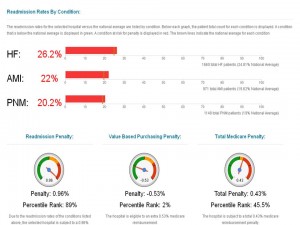By Stephen Tweed
We recently found a web site that allows you to enter in the name of a local hospital, and get a graphic display of their readmission rates for heart failure, heart attack, and pneumonia. These are the three diagnoses that are used to calculate the penalties in the Hospital Readmission Reduction Program in the Accountable Care Act. Beginning in October 2012, hospitals are being assessed penalties if their readmission rates for these three conditions exceed established standards.
Health Recovery Resources, a consulting firm that helps hospitals and patients reduce congestive heart failure re-admissions through a research based platform that constructively guides patient’s behavior, has set up the page on their web site. The Resources page says …
Unplanned readmissions generate substantial medical and financial burdens that cost Medicare $17 billion a year. With Heart Failure the most frequent reason for re-hospitalization, there is an urgent need for reform. As of October 1, 2012, Medicare will be reducing overall Medicare payment to hospitals with high readmission numbers. Through an analysis of hospitals projected to be penalized for their high readmission rates, Health Recovery Solutions has been able to identify potential clients, and plan strategically for their business. By addressing this issue, Health Recovery Solutions is emerging as market leaders for providers and patients as readmissions becomes more of a focal point of better care.
I went to the web site, put in my name and email address, and the name of a local hospital in Louisville. The results came back almost immediately. Here’s a look at what came back.
This can be a valuable tool for you to use in planning your sales presentations to local hospitals on how your home health agency can help them reduce avoidable readmissions. We’re finding that many hospital and health system executives respond positively to sales presentations that contain facts and data, and especially when the data are about their own organization.
The more you know about your customers, the more you can create a compelling value proposition by describing problems they have that you can solve through your home health and hospice services. If you have questions or would like to discuss how you can use this information and the Four P’s of Powerful Persuasive Presentations, don’t hesitate to email or give me a call at 502-339-0653.




